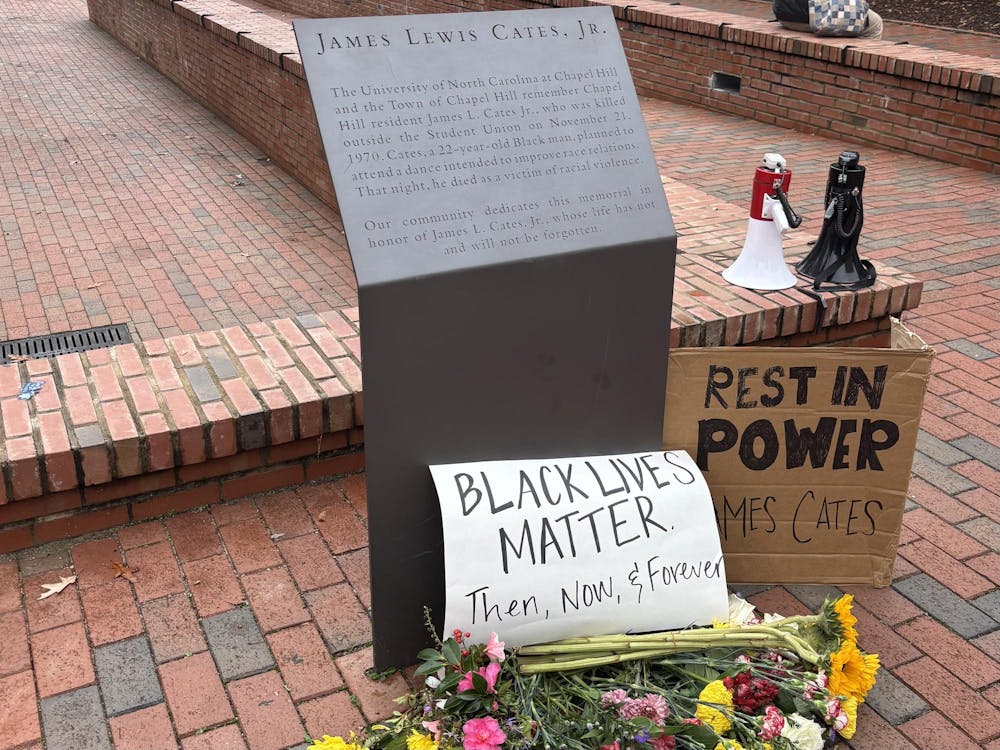In 2021, the Coalition created a proposal to rename the Student Stores in honor of Cates. Valerie Foushee, U.S. representative for N.C.’s fourth congressional district, along with Nate Davis, the retired director of the Hargraves Community Center for the Town of Chapel Hill were both in support of the change. Both Foushee and Davis are first cousins of Cates.
Two UNC students, SSAC and UNC NAACP event organizers, Samuel Scarborough and Sada Maryanov said they wanted to keep Cates and his family at the center of this event.
“I believe it more important to honor the fact that this was a life,” Maryanov said.
Both Scarborough and Maryanov found out about Cates through the Marian Cheek Jackson Center, a local organization that works to preserve the history of and support Black communities in Chapel Hill and Carrboro.
“I know there's the historical marker, placard, whatever you want to call it, right on the edge of the pit in between the Undergrad[uate] Library and Lenoir [Dining Hall],” Scarborough said. “But because of its position, whether it's the pit preachers or it just being out of the way, that's something I would have probably never seen.”
Maryanov and Scarborough also emphasized the language of the plaque and how they feel it minimizes the University’s complicity in Cates’ murder.
For individuals who might not be aware of the history of Cates' murder, Maryanov said the words of the plaque could be misleading; she said that "died" and "killed" carry completely different meanings.
Scarborough said that it is incumbent for people to acknowledge history and uphold the legacy of student advocates in the past.
“If [students] are not told about all these names on these buildings and where the roots of this institution come from, we are bound to repeat the same mistakes that many generations of past did,” Scarborough said.
Maryanov said she engaged with Cates’ legacy through the work of Mike Ogle, an independent journalist who has researched Cates.
Ogle first heard of Cates when he came across a photograph that had been taken on the first year anniversary of Cates’ death. He had initially thought that Cates’ story was well-known, but after searching, he said found very little information online.
"[I] eventually did a lot of archival research in Wilson Library, looking through University records, trying to find anything I could about it, which wasn't easy, because it wasn't, none of it was, categorized or marked," Ogle said. "You couldn't just search for James Cates in the archives."
To get the day's news and headlines in your inbox each morning, sign up for our email newsletters.
The work of the Remembrance Coalition brought Cates to the forefront, and Ogle’s research provided more insight into what happened than was previously available.
Ogle and Scarborough said they were concerned and hopeful, respectively, surrounding the future of the Cates memorial and whether it would be affected by the planned renovations in the Pit area.
In an email to The DTH, UNC Media Relations wrote that the University’s current construction plans for the Pit will not impact the memorial.
Ogle said while it has been good to see the acknowledgement of Cates and his life, he has not seen the University, campus and Chapel Hill police take adequate responsibility.
“It was just completely erased from communal memory,” Ogle said. “Almost right away.”
Cates’ memorial event, while described as a place to heal, presents another opportunity to move towards justice, Scarborough said.
Maryanov said that even though Cates is gone, his family is still very much alive.
“His family, they deserve more than a plate, and they deserve more, even, than a memorial,” she said. “They deserve real, real tangible things.”
Students should visit the Jackson Center website and engage with oral histories from the Northside community, Scarborough said.
“It is important in any action to keep community at the center,” he said.
@sarayuuu_t
@dailytarheel | university@dailytarheel.com




